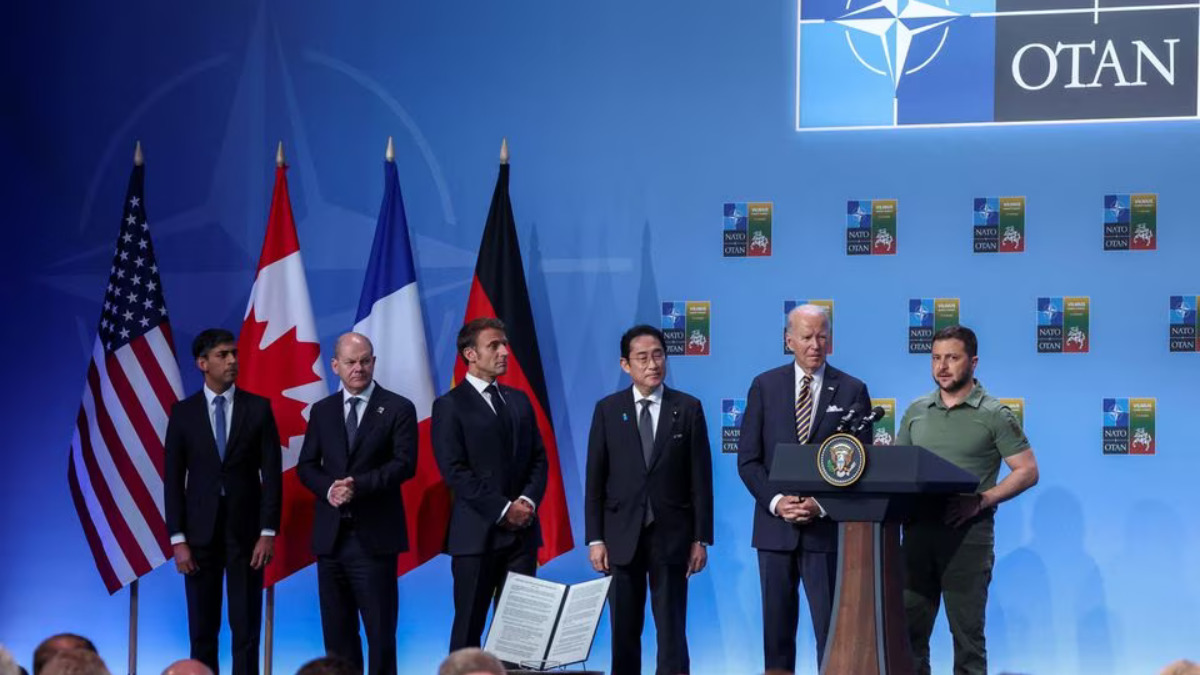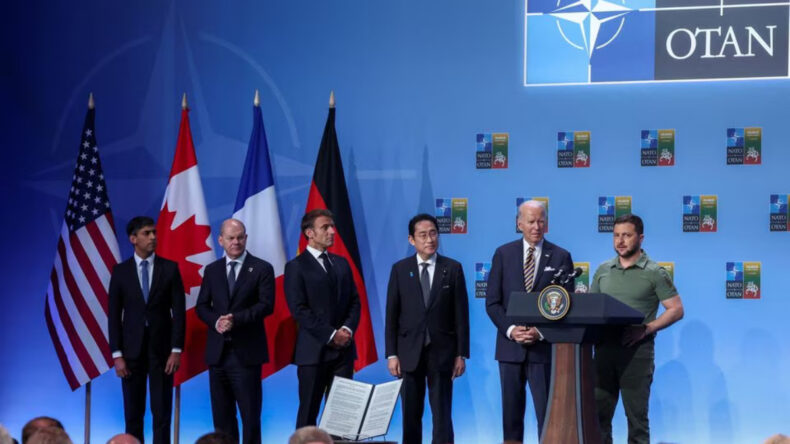Officials announced on Wednesday that the G7 nations have introduced a global framework aimed at ensuring the long-term security of Ukraine. The framework aims to enhance Ukraine’s defense capabilities against Russia and discourage Moscow from engaging in further acts of aggression.

Ukrainian President Volodymyr Zelenskiy held discussions with NATO leaders during a summit of the Western alliance, which consists of 31 member countries. The leaders affirmed that Ukraine’s future lies within NATO; however, they did not agree to Zelenskiy’s request for a specific timeline regarding Ukraine’s membership.
Due to the ongoing conflict with Russia, Ukraine is unable to become a member of NATO. Joining NATO would invoke Article 5, which states that an attack on one member is considered an attack on all, potentially leading to a direct confrontation with Russia. Despite this limitation, Ukraine has managed to secure certain benefits in terms of both immediate and long-term security commitments, which it has actively advocated for.
NATO has deliberately avoided providing military assistance to Ukraine as a collective organization to prevent getting directly involved in a conflict with Russia. Instead, NATO prefers to delegate such assistance to its member states and other entities. However, countries like Britain, France, Germany, and the United States have engaged in ongoing negotiations with Kyiv to establish a comprehensive international framework. This framework aims to cover various aspects, including the provision of advanced military equipment such as fighter jets, training programs, intelligence-sharing, and cyber defense support.
The G7, consisting of major industrialized nations, announced in a statement their initiation of negotiations with Ukraine. The objective of these negotiations is to establish formal bilateral security commitments and arrangements within the framework of the multilateral agreement. These commitments will be in line with the legal and constitutional requirements of each participating nation. The G7 aims to provide steadfast support to Ukraine as it safeguards its sovereignty and territorial integrity.
During the signing ceremony of the plan, U.S. President Joe Biden emphasized its significance, describing it as a strong affirmation of their dedication to Ukraine. Ukrainian President Volodymyr Zelenskiy acknowledged the security guarantees being established for Ukraine as it progresses towards NATO membership. He also mentioned that these assurances would be expanded through agreements with key partner nations.
Zelenskiy’s delegation expressed satisfaction with the outcome, referring to it as a major security triumph for Ukraine. However, Kremlin spokesman Dmitry Peskov criticized the G7’s decision, considering it misguided and potentially posing a significant danger. Russia argued that providing Ukraine with security guarantees would encroach upon its own security interests. Moscow has previously cited NATO’s expansion towards its borders as a contributing factor in its decision to invade Ukraine, a country that leans towards the West and was formerly part of the Russian-dominated Soviet Union.
The G7, consisting of the United States, Germany, Japan, France, Canada, Italy, and Britain, along with the European Union, stated that additional countries could join and make their own commitments within the framework. The G7 nations declared their intention to initiate bilateral discussions with Ukraine without delay. Ukrainian President Zelenskiy, in a separate press conference, stated that the newly established document would remain valid until Ukraine becomes a member of NATO. He expressed that today’s declaration provides the opportunity for strong bilateral agreements, while emphasizing that the ultimate guarantee for Ukraine’s security lies in being a part of the NATO alliance.
‘Time not on Russian side’
As part of the agreement, the G7 statement mentioned that Ukraine would commit to taking measures to enhance democratic governance. These measures include implementing reforms in areas such as the judiciary, economy, and transparency to strengthen democratic practices.
In return, the G7 nations pledged to collaborate with Ukraine on an expanded set of security commitments and arrangements, specifically aimed at enabling Ukraine to protect its territory and sovereignty in the event of future acts of aggression.
Under the agreement, Ukraine has agreed to undertake democratic governance improvements, including judicial and economic reforms and increased transparency.
In exchange, the G7 has committed to working with Ukraine to establish an extended package of security commitments and arrangements. These measures are designed to empower Ukraine to defend its territory and sovereignty in the face of potential future acts of aggression.
According to a White House official, the multilateral declaration will convey a powerful message to Russia that time is not in its favor. The United States, on its part, will commence negotiations with Kyiv in the near future.
President Joe Biden has mentioned the possibility of using the U.S. support for Israel as a potential model. The U.S. provides approximately $3.5 billion in annual military aid to Israel, and the relationship encompasses substantial political backing as well.
Germany has announced its commitment to providing military support to Ukraine, starting with an allocation of 12 billion euros until 2032. Out of this amount, 3.2 billion euros will be allocated for the year 2024.
France, on the other hand, recently declared its intention to supply long-range cruise missiles to Kyiv for the first time. The country is also engaged in negotiations with Ukraine; however, it may face challenges during parliamentary discussions regarding its military budget for the period from 2025 to 2030.
British Defence Secretary Ben Wallace stated to reporters that the UK, along with other nations, plans to deploy personnel to Ukraine following the war in order to continue training and assisting its armed forces.













